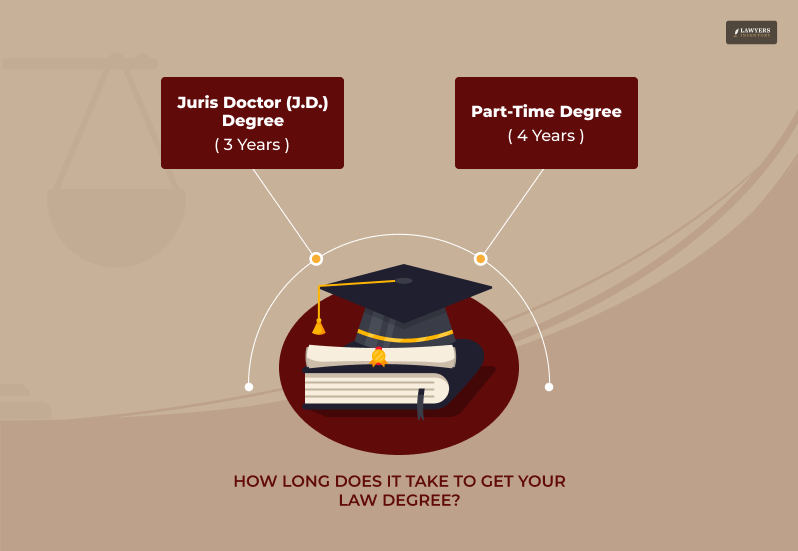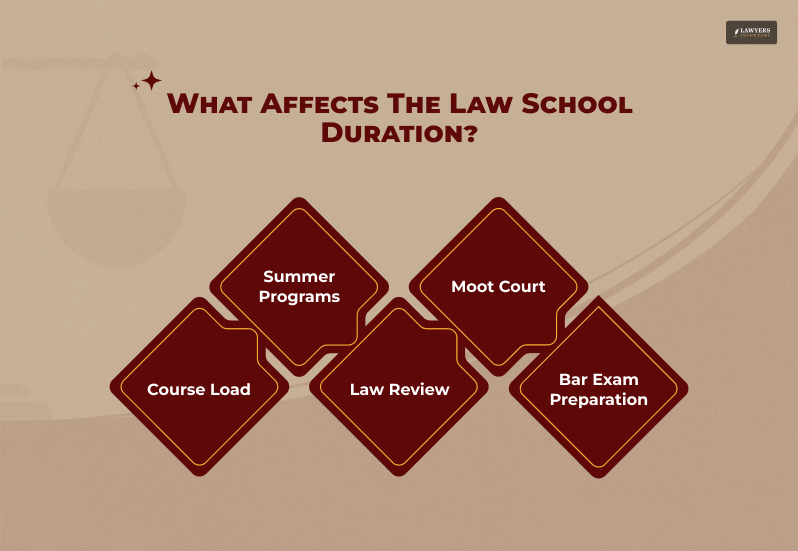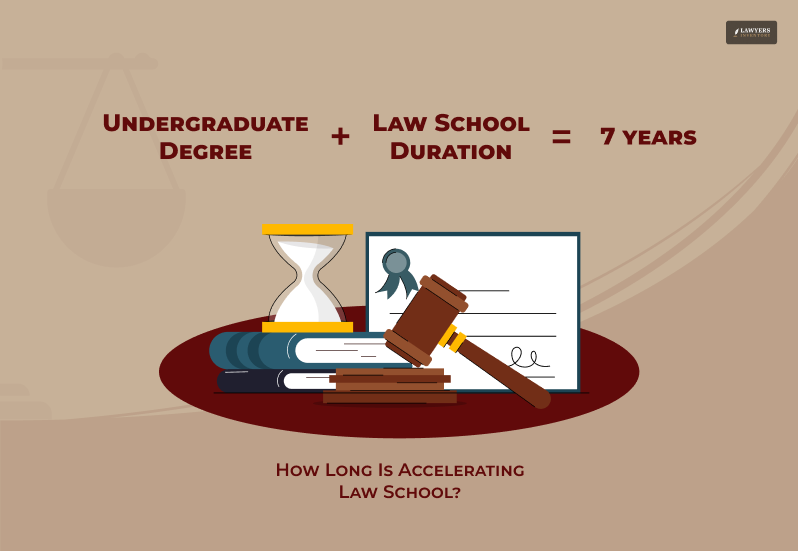
So, you’re considering law school? That’s a fantastic decision! But before you dive into the legal world, let’s talk about how long is law school. How long does it typically take to earn a law degree?
In this article, I will delve into law school programs’ standard duration and explore potential ways to accelerate the process.
Whether you’re a recent college graduate or looking to switch careers, this information will help you plan your journey to becoming a lawyer.
Moreover, understanding the typical length of law school can help you set realistic expectations and make the right decision about your education.
Additionally, exploring options to speed up the process can give you more flexibility and save time and money.
How long is Law School: Standard Law School Duration

Most law schools in the United States follow a three-year curriculum. This means it typically takes three years of full-time study to earn a Juris Doctor (J.D.) degree, the standard law degree in the U.S.
These three years are usually divided into semesters or quarters, depending on the school’s academic calendar. This structure allows for a structured and progressive learning experience, covering various legal subjects and preparing students for the challenges of legal practice.
While three years is the standard, some law schools offer accelerated programs that may allow you to complete your J.D. in less time. However, these programs can be quite demanding and require significant dedication and hard work.
Let us now get into the details:
J.D. Program
Most law schools in the United States follow a three-year curriculum for their Juris Doctor (JD) program. This means it typically takes three years of full-time study to earn a J.D. degree, the standard law degree in the U.S.
These three years are usually divided into semesters or quarters, depending on the school’s academic calendar. This structure allows for a structured and progressive learning experience, covering various legal subjects and preparing students for the challenges of legal practice.
LLM Programs
A Master of Laws (LLM) degree may be something you want to pursue if you’re a J.D. holder and wish to focus on a specific area of the law.
These programs aim to offer advanced training in particular legal areas, like tax law, international law, or environmental law.
LLM programs normally last one or two years depending on the program and the necessary coursework.
They can significantly improve your career prospects and understanding of a particular area of law.
Juris Doctorate (JD) + Master’s Degree
Some law schools offer combined J.D. and Master’s degree programs. This allows you to earn a J.D. and a Master’s degree in a related field, such as business administration or public policy, in a shorter amount of time than it would take to pursue each degree separately.
These combined programs can be great for students who want to develop broader skills and knowledge.
However, they can also be quite demanding, so it’s important to carefully consider your academic and career goals before deciding if a combined program is right for you.
Factors Affecting Law School Duration

While the standard law school duration is three years, several factors can influence how long it takes to complete your J.D.
One of the most significant factors is your course load. If you take a full-time course load, you’ll typically complete your degree in three years. However, if you opt for a part-time course load, it will likely take longer.
Another factor to consider is whether you participate in extracurricular activities like law review or moot court. These activities can be time-consuming but provide valuable experience and enhance your law school application.
Finally, the time you dedicate to preparing for the bar exam can also affect your law school duration.
The bar exam is a rigorous test that requires significant preparation, so it’s important to allocate enough time for studying and practice.
Course Load
One of the primary factors affecting how long it takes to complete law school is your course load.
Most law students opt for a full-time course load, generally involving taking a set number of courses per semester or quarter. This allows students to complete their degree in the standard three-year timeframe.
However, some students may choose to attend law school part-time. This option can benefit those balancing their studies with other commitments, such as work or family. However, completing your degree will likely take longer if you attend law school part-time.
In addition to your overall course load, the specific courses you choose can also impact your law school duration. While most law schools have a core curriculum that all students must complete, you may also have the opportunity to take elective courses.
These courses can allow you to specialize in a particular area of law or explore topics that interest you. However, taking too many elective courses can extend your time in law school.
Additionally, the type of course you choose can also have an impact on the duration:
- Part-Time Study: Many law schools offer part-time programs for students who must balance their studies with other commitments, such as employment, family responsibilities, or other personal obligations. Part-time programs generally involve taking fewer credit hours per semester, which extends the overall duration of the program. It typically takes four to six years to complete a J.D. degree part-time.
- Full-Time Study: The traditional path involves enrolling full-time, typically taking a prescribed number of credit hours per semester or quarter. This allows students to complete the J.D. program in three academic years. Full-time study requires a significant time commitment, dedicating most of the week to classes, reading, research, and studying.
Summer Programs
Many law schools offer summer programs that can help you accelerate your law school education. These programs typically involve taking intensive courses over the summer months.
Additionally, completing these courses can earn additional credits and potentially shorten your overall time in law school.
Summer programs can also provide valuable opportunities for research and networking.
Some law schools offer research opportunities that allow students to work with faculty members on research projects.
This can be a great way to gain practical experience and learn more about your chosen field of law.
Here are the major benefits:
- Accelerated Graduation: Summer courses can allow students to earn additional credits, potentially enabling them to graduate early or lighten their course load during the regular academic year.
- Focus on Specific Areas: Summer courses can sometimes focus on specialized areas of law, allowing students to explore their interests in more depth.
- Reduced Course Load During Regular Semesters: By taking some courses during the summer, students can reduce their course load during the fall and spring semesters, potentially allowing for more time to focus on complex subjects or pursue extracurricular activities.
However, it is important to note that summer courses are often condensed and intensive, requiring a significant time commitment during the summer months.
Law Review and Moot Court
Participating in extracurricular activities like law review or moot court can greatly enhance your law school experience and improve your career prospects. However, these activities can also be time-consuming.
Law Review is a student-run journal that publishes articles on legal topics. Participating in law review can be a great way to develop your writing and research skills. However, it can also be a significant time commitment.
Moot court is a competition in which students argue hypothetical legal cases. Participating in moot court can help you develop your oral advocacy skills and learn more about the courtroom environment.
However, it can also be time-consuming, especially if participating in multiple competitions.
Bar Exam Preparation
The bar exam is a rigorous test that all law school graduates must pass to become licensed attorneys. Preparing for the bar exam can be a significant time commitment.
Most law schools offer bar exam preparation courses to help you study for the exam. However, you will also need to dedicate much time to independent study.
The time spent preparing for the bar exam can indirectly affect the overall timeline from starting law school to beginning legal practice:
- Dedicated Study Time: Graduates dedicate several weeks or months to intensive bar preparation after graduation. This period is often considered a full-time job in itself.
- Bar Exam Results: If a graduate does not pass the bar exam on their first attempt, they will need to spend additional time studying and retaking the exam, potentially delaying their entry into the legal profession.
If you fail the bar exam, you will need to retake it. This can significantly extend your time in law school. It’s important to be prepared for the possibility of failing the bar exam and to have a plan for handling a retake if necessary.
Extracurricular Activities
Extracurricular activities can significantly enrich the law school experience and enhance career prospects. Still, they also require a substantial time investment:
- Legal Clinics: Legal clinics provide students with hands-on experience representing real clients under the supervision of experienced attorneys. This is a valuable opportunity to develop practical legal skills and contribute to the community. However, clinic work can be time-intensive, requiring client meetings, court appearances, and case preparation.
- Other Student Organizations: Numerous other student organizations are related to specific areas of law, professional development, or social interests. While these organizations offer valuable networking and learning opportunities, they also require a time commitment.
While these activities are valuable, balancing them with academic work is important to ensure timely progress toward graduation.
Accelerating Law School: An Effective Alternative?

While the traditional three-year, full-time J.D. program remains the most common path to becoming a lawyer, some students seek ways to accelerate their legal education.
Several options exist, each with its own set of advantages and disadvantages. It’s crucial to carefully consider these factors before deciding if an accelerated path is right for you.
Accelerated J.D. Programs (Two-Year Programs):
A small but growing number of law schools offer accelerated J.D. programs designed to be completed in two calendar years. These programs condense the standard three-year curriculum into a shorter timeframe through several key strategies:
- Elimination or Shortening of Breaks: Traditional summer and winter breaks are either eliminated or significantly reduced, allowing continuous study.
- Summer Coursework: Intensive courses are offered during the summer months, allowing students to earn credits year-round.
- Increased Course Load: Students typically take more credit hours per semester or quarter than in a traditional program.
Advantages of Accelerated J.D. Programs:
- Faster Entry into the Legal Profession: Graduating a year earlier allows students to begin practicing law and earning a salary sooner.
- Potential Cost Savings: While the cost per semester might be higher due to the increased workload, graduating a year earlier can result in lower overall tuition and living expenses. This is not always the case, so careful financial planning is essential.
- Earlier Return on Investment: Starting legal practice earlier means an earlier return on the significant investment of time and money in legal education.
Disadvantages of Accelerated J.D. Programs:
- Intense Workload and High Risk of Burnout: The condensed schedule demands a rigorous pace with little time for rest, personal commitments, or reflection. This significantly increases the risk of burnout and can negatively impact mental and physical health.
- Limited Opportunities for Internships and Networking: The lack of traditional summer breaks significantly restricts opportunities for legal internships, clerkships, and externships. These experiences are crucial for gaining practical legal skills, building a professional network, and securing post-graduation employment.
- Potential Impact on Bar Exam Preparation: The fast-paced curriculum may leave less time for in-depth review and preparation for the bar exam. This is a critical concern, as passing the bar is essential for practicing law. Students may need to dedicate significant time to bar prep immediately after graduation, potentially delaying their job search.
- Reduced Opportunities for Extracurricular Activities: Participation in law review, moot court, legal clinics, and other extracurricular activities may be limited due to the demanding academic schedule. These activities offer valuable skill development, networking opportunities, and resume-building experience.
- Potential Employer Perceptions: While less common than in the past, some employers, particularly larger firms or government agencies, may still prefer candidates from traditional three-year programs, believing they have received a more comprehensive and well-rounded legal education. This perception is changing, but it’s still worth considering.
Transferring Credits
In some limited cases, students may be able to transfer a small number of credits from previous graduate coursework (e.g., a master’s degree in a related field) to their J.D. program.
However, this is not common and is subject to strict limitations set by individual law schools. Typically, only a few credits, if any, will be accepted, and they must be from courses closely related to legal studies.
Psst… Don’t rely on this as a significant way to accelerate your studies.
Online Law Schools (Proceed with Extreme Caution)
Online law schools offer flexibility and often lower tuition costs, which can be appealing. However, there are significant drawbacks that must be carefully considered:
- Accreditation Concerns: Not all online law schools are accredited by the American Bar Association (ABA). ABA accreditation is essential for graduates to be eligible to take the bar exam in most states. Attending a non-ABA-accredited law school severely limits your career options.
- Bar Passage Rates: Historically, graduates of online law schools have had lower bar passage rates than graduates of traditional, ABA-accredited programs.
- Employer Perception: Many employers, particularly in competitive legal markets, may view online law degrees skeptically, especially if the program is not ABA-accredited.
- Lack of In-Person Networking: Online programs lack the crucial in-person networking opportunities that traditional law schools provide. Building relationships with professors and classmates is essential for career development.
If you are considering an online law school, prioritize ABA accreditation. Thoroughly research the program’s bar passage rates and employment outcomes before making a decision. Proceed with extreme caution, as the potential drawbacks are significant.
Summer Courses (Within a Traditional Program)
Taking summer courses within a traditional three-year J.D. program can allow students to lighten their course load during the regular academic year or potentially graduate a semester early.
This is a less drastic form of acceleration compared to two-year programs. However, it still requires a significant time commitment during the summer months.
Considerations for Accelerated Law School
Although it may be alluring to expedite law school, it’s crucial to balance the advantages over the disadvantages. The caliber of education you will get is among the most crucial factors.
Quality of Education
Ensure the law school is accredited by the American Bar Association (ABA) before considering an accelerated program.
A quality indicator, ABA accreditation may impact your future employment opportunities. You should also do some research on the law school’s faculty.
Do they have a lot of experience and knowledge in their field? Do former students and alumni think well of them? An excellent faculty can have a big impact on your legal education.
Career Implications
Accelerating law school could affect your professional path. Some employers may prefer candidates who have finished a traditional three-year program.
Additionally, students who have finished accelerated programs may find certain bar exams more difficult.
It is imperative to investigate the particular prerequisites for the bar examination in your jurisdiction and contemplate the potential impact of an expedited program on your readiness.
Personal Well-being
Programs for accelerated law school can be taxing and stressful. It’s crucial to consider your well-being before determining whether or not an accelerated program is best for you.
Consider carefully before committing to an accelerated program if you already feel overburdened or under pressure.
Prioritizing your mental health and well-being is crucial, even if it necessitates approaching law school more conventionally.
Breathe, Think, Decide
Understanding your options is key, whether you want to dive right in or take it a bit slower. Remember, there’s no one-size-fits-all answer. It’s all about finding what works best for you.
I hope that you found your answer to the question, “How Long is Law School?”
Do your research, talk to people there, and don’t be afraid to ask questions. Good luck on your law school journey!
Read More…
- Everything You Need To Know About Super Lawyers
- All You Need To Know About An In-House Lawyer In The US
- How to Become a Supreme Court Lawyer in LESS Time and Money?











0 Reply
No comments yet.